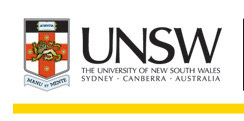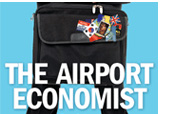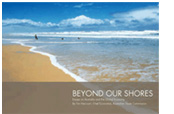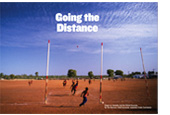Hello to the age of Asia
An Interview with Frances Adamson, Australia’s Ambassador to China.
TIM HARCOURT: Was growing up in South Australian important to you in terms of opportunity?
FRANCES ADAMSON: Growing up in South Australia in the 1960s and 1970s, I certainly had a belief that anything was possible, and that a good education and hard work could lead one in potentially all sorts of directions. Although I grew up with a keen interest in South Australia and Australia I was always aware of the region and indeed the world beyond, and no doubt was influenced by South Australia’s multicultural heritage.
TH: How important was the study of economics at Adelaide University to you in your later career as a diplomat?
FA: I graduated from the University of Adelaide with a degree in economics in 1985, and it was that degree which opened up opportunities for me in Canberra. I had a choice of graduate entry to either Treasury or the Department of Foreign Affairs, but chose Foreign Affairs.
It was certainly my economics background which lead to my first posting to the Australian Consulate General in Hong Kong in 1987. There I was responsible for economic matters, including analysis of Hong Kong’s role, then mainly as an entrepot, in China’s opening to the outside world which had commenced in the late 1970s.
Although I am not a professional economist, I’ve always felt my economics background has given me a good grounding in and understanding of the workings of individual economies and global economic developments. After more than 30 years of economic reform, China’s economy is now a major driver of global growth. The complementarity of the Chinese and Australian economies is strong and all Australian states benefit from this, whether through trade in goods and services, investment flows, visits by tourists and students or the exchange of ideas.
TH: Your mother was a very prominent Cabinet Minister in South Australia, did she influence your interest in public service and representation?
FA: My mother, father and extended family have had an interest in serving our wider community and have done so in a variety of ways. My sister, Christine, is a Supreme Court Judge in New South Wales, and my brother, Stuart, an ordained pastoral care worker. I was certainly attracted to diplomacy as an opportunity to serve Australia overseas.
TH: The White Paper on the Asian Century talks about the importance of language. How important is it speak Mandarin? In diplomacy and in business? Should Australians speak Asian languages or be ‘Asian business’ literate’?
FA: The White Paper emphasises the importance of learning Asian languages and also the broader idea of Australians becoming more Asia-literate – more knowledgeable about Asia and its many countries and cultures, and more comfortable with working with the people of Asia to strengthen and deepen our relationships. During my visit to South Australia I will be visiting Highgate Primary School and Adelaide University’s Confucius Institute to speak to students studying Chinese there. Learning a foreign language is not easy, but communicating with people in their own language is very rewarding, and I highly recommend it.
TH: How does South Australia fare in China? Is South Australia on the radar? How important is a state brand overseas?
FA: China is South Australia’s largest export market and an important source of tourism and students. South Australia’s two-way merchandise trade with China in the first half of this year was worth a little over A$3.5 billion, with South Australian exports to China accounting for A$2.2 billion of this. South Australia’s largest exports were minerals, including iron ore and copper, and while South Australia may not share the high profile of the largest mineral producing states, it is well-regarded as a reliable source of the minerals that are helping to fuel China’s economic growth.
South Australia is also well-known for its high quality agricultural products. South Australian exports of wine to China in the first half of the year were worth $111 million, and iconic brands like Penfolds already have a strong market presence in China. Added to this were $66 million in wheat exports, $64 million in wool exports and significant exports of barley. All of this combines to give South Australia a reputation for excellence and quality as a food, wine and agricultural producer.
South Australia is working hard in China to build its reputation as a diverse and pristine destination for tourists, and as a centre for educational excellence. Indeed, these are both key aspects of the South Australian Government’s China Strategy. In 2011, there were over 28,000 Chinese tourists who visited South Australia, and more than 15,000 Chinese students enrolled in South Australian institutions. This is a strong base for further growth.
South Australia is well known and well regarded in Shandong Province on China’s East Coast, where it enjoys a long-standing sister State relationship. When I meet Chinese who have visited South Australia, their faces light up with enthusiasm when discussing the State’s many attributes. But China is a country of 1.3 billion people and there are many Chinese who, while they have heard of Australia, are not aware of the identities of our individual States. On State branding there is certainly a role for State promotion, but in a country like China there are benefits to the States and the Federal Government working together to promote our interests in China. This is very much the approach of the Embassy. We helped support the visit to China in July by Premier Weatherill and by other State Ministers and delegations, including regular visits from South Australian universities. The Embassy also meets with businesspeople from South Australia to provide advice on business conditions in China and Austrade stands ready to assist with specialist services.
TH: Should South Australia worry about the ‘brain drain’ to London and Asia etc…or see the “Generation Expat” network as an advantage?
FA: In this era of globalisation, South Australia is very well served by South Australians at home and abroad, whether they be temporarily overseas or more permanently based there as expatriates. During my postings in London, Hong Kong and Beijing, I have always found South Australians to be loyal and enthusiastic in their support of the State and willing to share their knowledge with fellow South Australians who may be venturing overseas for the first time.
TH: The Asian Century report talks about a new wave of commercial ties in education, professional services and other sectors. What are Australia’s and SA’s prospects?
FA: The White Paper gives considerable weight to promoting stronger ties in the region through education and other services sectors. It notes that an increasingly wealthy and mobile middle class is emerging in the region, creating new opportunities in a diverse range of goods and services, from health and aged care to education. Demand for high-quality services, like education, outstrips supply in many areas of China. In recognition of this increased opportunity for greater trade in services, the Minister for Trade and Competitiveness, Dr Craig Emerson, co-chaired an inaugural Ministerial dialogue with his Chinese counterpart in Beijing earlier this year. The dialogue brought together representatives from both countries’ services sectors, including professional and financial services, to look at practical ways to promote greater services trade.
Australia has a well-established reputation in the international education market, and has built deep and broad relationships within the region. Education is already Australia’s fourth-largest export earner, and our biggest services export. One of the 25 national objectives in the White Paper was for every Australian student to have significant exposure to studies of Asia across the curriculum. In addition, all Australian schools would engage with at least one school in Asia to support the teaching of a priority Asian language, which includes Mandarin. In this context, I see tremendous potential for continuing to engage with China.
The White Paper will help shape South Australia’s push to further promote already strong education links with China. Last year there were over 13 000 Chinese students enrolled in SA universities, schools, vocational institutions and English-language colleges – accounting for 40 per cent of all international students enrolled in South Australia. South Australia is also home to a Confucius Institute, at Adelaide University, which will promote the learning of Chinese language and culture within South Australia. Tourism is another key sector that South Australia is working hard to promote in China – last year South Australia welcomed 28 000 visitors from China. With some of Australia’s most attractive destinations, I think South Australia will increasingly attract the rapidly growing number of Chinese tourists to Australia, including an increasing number of independent travellers
*Frances Adamson is Australia’s Ambassador to China, Tim Harcourt is the JW Nevile Fellow in Economics at the Australian School of Business, UNSW and the inaugural Adviser- International Engagement to the Hon. Jay Weatherill, Premier of South Australia.
This interview is courtesy of The Advertiser.













No Comments so far ↓
Comments are closed.